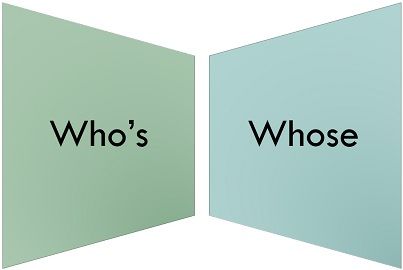 The words who’s and whose are derived from the pronoun ‘who’ which are often pronounced the same, but there is a huge difference between them when it comes to meaning and usage. Who is a wh-word which means ‘what person we are talking about’. It is mainly used to ask questions about any person. While who’s is not a single word, instead it is a contraction of two words i.e. who is or who has.
The words who’s and whose are derived from the pronoun ‘who’ which are often pronounced the same, but there is a huge difference between them when it comes to meaning and usage. Who is a wh-word which means ‘what person we are talking about’. It is mainly used to ask questions about any person. While who’s is not a single word, instead it is a contraction of two words i.e. who is or who has.
On the other hand, whose is used to show possession over something. Let’s look at the given examples to understand the difference between who’s and whose:
- Who’s that writer whose writing style is very commendable?
- Kate is the girl whose name appeared in the merit list and who’s also a topper at the state level.
- Who’s the employee, whose wife called yesterday?
- Can you tell me who’s the lady whose dog was stolen yesterday?
In all the four cases the word ‘who’s’ is the shortened form of the term ‘who is’, to make the sentence shorter and easy to read. On the other hand, the word whose tells you ‘the possessor or person to whom the object relates or belongs’ in the examples given above.
Content: Who’s Vs Whose
Comparison Chart
| Basis for Comparison | Who's | Whose |
|---|---|---|
| Meaning | The word 'who's' is an acronym for the term 'who is' or 'who has'. | The word 'whose' is used to determine belongingness of something with someone. |
| What is it? | Contraction | Pronoun, Determiner |
| Conjunction | No | Yes |
| Examples | Who's he talking to? | Whose fingerprints are these? |
| Who's your brother? | Whose pet is making noise? | |
| He is a sincere student, who's always on time. | Joe is the one whose guidance helped me in passing my exams. | |
| She is my teacher who's also a mentor to me. | In whose party are we going tonight? |
Definition of Who’s
The word ‘who’s is a contracted form of two words i.e. who is or who was and sometimes who has, wherein who is a pronoun and is/was/has are helping verbs. It is commonly used in spoken English, but can also be used in written English, when the writing is done informally, in the sense that contraction of words is a bit inappropriate when it comes to formal writing.
Examples:
- Who’s is he going to call for help?
- Who’s that girl with spectacles?
- Do you have any idea who’s going to the party tonight?
- That lady over there is the one who’s going to be our new warden.
- She will find out who’s done this to her.
- Who’s sent you here?
Definition of Whose
Whose is a wh-word, used to ask questions about belongingness or association of something with someone, i.e. which person owns something. It is usually followed by a noun or a pronoun. Further, it can also act as a conjunction, to introduce a relative clause in a sentence to mention something that is related to the person or thing stated in the main clause.
Examples:
- Whose dog is this?
- I have no idea, whose pen it was.
- Can you tell me the lady whose bag was stolen that day?
- Whose anniversary is it yesterday?
- Here is the novel, whose author is my relative.
- I saw two ladies talking to the person, whose eyes were injured.
Key Differences Between Who’s and Whose
The points given below are substantial so far as the difference between who’s and whose is concerned:
- The word who’s is the shortened form of the term who is/who was/who has, which is used to ask a question or tell about a person. Conversely, the word ‘whose’ expresses that the succeeding noun or pronoun belongs to or associated with which person or thing.
- Who’s is nothing but a contraction, whereas whose is a pronoun or determiner.
- While whose can be used as a conjunction to introduce a relative clause in a sentence, who’s cannot be used as a conjunction.
Examples
Who’s
- Who’s coming next?
- Who’s shown the picture to you?
- She is the one who’s brought the snacks for all of us.
- Are you the one, who’s won the second prize at the singing competition?
Whose
- Whose bag is this?
- He is someone whose paintings are famous worldwide.
- I am just surprised whose idea was it?
- She is my sister whose name is Alia.
How to remember the difference
To sum up, Whose is the possessive form of who, that indicates ‘related to whom’. As against Who’s is the contracted form of the ‘who is’, which determines what or which person you are talking about in your question.






Leave a Reply